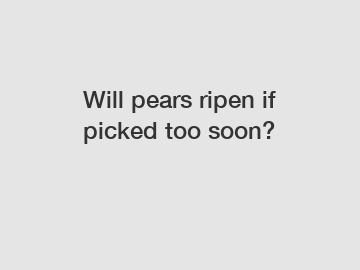Will pears ripen if picked too soon?
Will pears ripen if picked too soon?
Pears, with their juicy and sweet flesh, are a delightful fruit that many enjoy. However, one common concern among fruit enthusiasts is whether pears will ripen if picked too soon. This question arises because picking fruits prematurely can often lead to disappointment when they fail to develop their full flavor and ripeness. In the case of pears, understanding the factors that influence their ripening process is crucial to enjoying them at their best. Let's delve into this topic and shed some light on whether pears can ripen if picked too soon.
1. The significance of proper harvest timing.

A key factor in determining the ripeness of pears is the optimal harvest timing. Pears are unique among fruits, as they do not ripen on the tree like apples. Instead, they ripen after being picked. Picking pears at the right time ensures the best flavor and texture. Harvesting too early can result in fruit that remains underdeveloped, with a raw taste and an unpleasant texture.
2. Factors affecting pear ripening.
Several factors impact the ripening process of pears. One crucial element is the pear variety. Different varieties have varying maturation periods, so it is essential to be aware of the specific variety you are dealing with. Additionally, environmental conditions such as temperature and humidity play a role in the ripening process. Pears require a cool and slightly humid environment to ripen properly.
3. Ethylene and pear ripening.
Ethylene gas is a naturally occurring plant hormone responsible for triggering ripening processes in fruits, including pears. When pears are picked too soon, they lack the necessary levels of ethylene to initiate ripening. This can result in a prolonged period before the fruits become soft and acquire their desired sweetness. Additionally, pears that do not receive adequate ethylene may never ripen properly, remaining hard and tasteless.
4. The importance of post-harvest care.
To ensure that pears ripen after being picked, proper post-harvest care is crucial. After harvesting, pears should be stored in a cool, dark place with moderate humidity. Exposing them to direct sunlight or storing them in excessively warm conditions can hinder their ripening process. By providing the right environment for the fruit to mature, you enhance the chances of the pears ripening as desired.
5. Recognizing when pears are ready to eat.
Determining the ideal ripeness of pears can be challenging, as it varies depending on the variety. However, a few indicators can help you identify whether the fruit is ready to be enjoyed. Firstly, pears should yield slightly when pressed at the stem end. If the fruit remains firm, it is not yet ripe. Secondly, the color of the skin may change as the pear ripens, with some varieties becoming slightly lighter. Finally, a gentle fragrance emanating from the pear is another positive sign of ripeness.
In conclusion, pears can ripen if picked too soon, but the process may be delayed or impaired. Achieving the perfect ripeness in pears requires proper harvesting at the correct stage of maturity and providing suitable post-harvest care. By understanding the factors that influence pear ripening, such as ethylene gas and environmental conditions, individuals can ensure their pears reach the desired level of flavor and texture. So, next time you're tempted to pluck a pear before it's truly ready, remember that patience is key to savoring the full potential of this delightful fruit.
Want more information on Yellow Pears Benefits, Crown Pear Manufacturer, Snow Pear Buy? Feel free to contact us.


